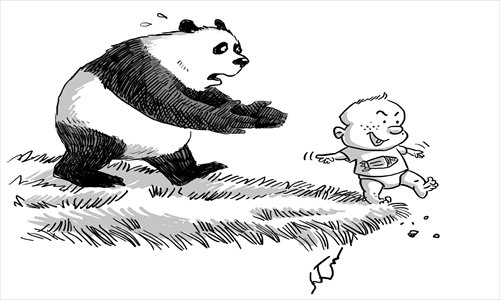Ditching Pyongyang more disastrous option

After North Korea conducted its third nuclear test and declared to unilaterally nullify the 1953 Korean War armistice agreement, many at home and abroad called a drastic adjustment in China's policy toward North Korea. Some even suggest a complete break with Pyongyang.
For one thing, they argue, with the rapid development of modern military technology, three-dimensional battle has replaced traditional land and sea battle, which has caused the Korean Peninsula to lose geopolitical importance. It has become outdated to say that North Korea is a steel barrier for China.
They also argue that North Korea clings to a backward economic model even as it runs rampant with its quest for nuclear weapons, and has broken faith with China.
However, I am against these arguments. It's undeniable that from the perspective of modern high-tech war, an air-land-sea three-dimensional battle could easily break through boundaries of states. But it would be a serious mistake to simply decry the significance of geopolitics.
Famous Dutch-American geostrategist Nicholas John Spykman once said, "Who controls the Rimland rules Eurasia; and who rules Eurasia controls the destinies of the world." The strategic value of the Korean Peninsula is eternal.
There is a popular theory arguing that whoever has the leading edge of science and technology and controls key areas has the world's hegemonic power. In fact, the reason why the US is the dominant power globally is that the US largely controls key areas of the world.
The Korean Peninsula is close to China's capital. It's a strategic area where the US, China, Japan and Russia contend with each other. Given the US pivot to the Asia-Pacific region, the strategic significance of the Korean Peninsula has become more prominent.
The Korean Peninsula is the key region for the US attempt to dominate Northeast Asia and contain China's rise. But meanwhile, it could also be a way for China to counterbalance the US.
It's wrong to say that China only pays attention to the strategic significance of the north of the Korean Peninsula while overlooking the south. In international public opinion, many equalize the Korean Peninsula to North Korea, which is a commonsense misunderstanding.
Those who argue North Korea has betrayed China are also wrong. Such argument is mainly based on an assumption that China's relations with Pyongyang are conducted of ideological concerns or Cold War mentality.
However, the fact is that since China and South Korea established diplomatic relations in 1992, China has shaken off ideological shackles in diplomacy.
The China-North Korea relations are normal relations between two countries. China doesn't totally agree with North Korea's domestic and diplomatic policies. Beijing firmly opposes North Korea's nuclear plan, and there are also some structural conflicts between the two countries. But China never interferes in North Korea's domestic affairs.
Most of China's neighboring countries are non-socialist countries, and China has tried to maintain sound and friendly relations with each of them. China attaches no less importance to its relationship with South Korea than with North Korea. It's unrealistic to put the China-North Korea relationship beyond the China-South Korea one. The two Koreas are of the same strategic importance to China.
Those who support China abandoning North Korea also overlook the disastrous results it will bring.
If that happened, the Korea Peninsula would become more unbalanced. If external powers interfere in peninsula issues, there would be either a regional war that would result in numerous refugees or a nuclear war with dreadful consequences.
If South Korea resorts to force to unify the peninsula, the region would be trapped in long-term chaos, as happened in the Middle East.
A turbulent Korean Peninsula is harmful to China and the Northeast Asia. Both China and South Korea could be victims.
The cost of abandoning North Korea is much higher than that of protecting it. China's strategic considerations should be aimed at maintaining the stability of the Korean Peninsula.
The author is a professor at the School of International Studies at Peking University. opinion@globaltimes.com.cn